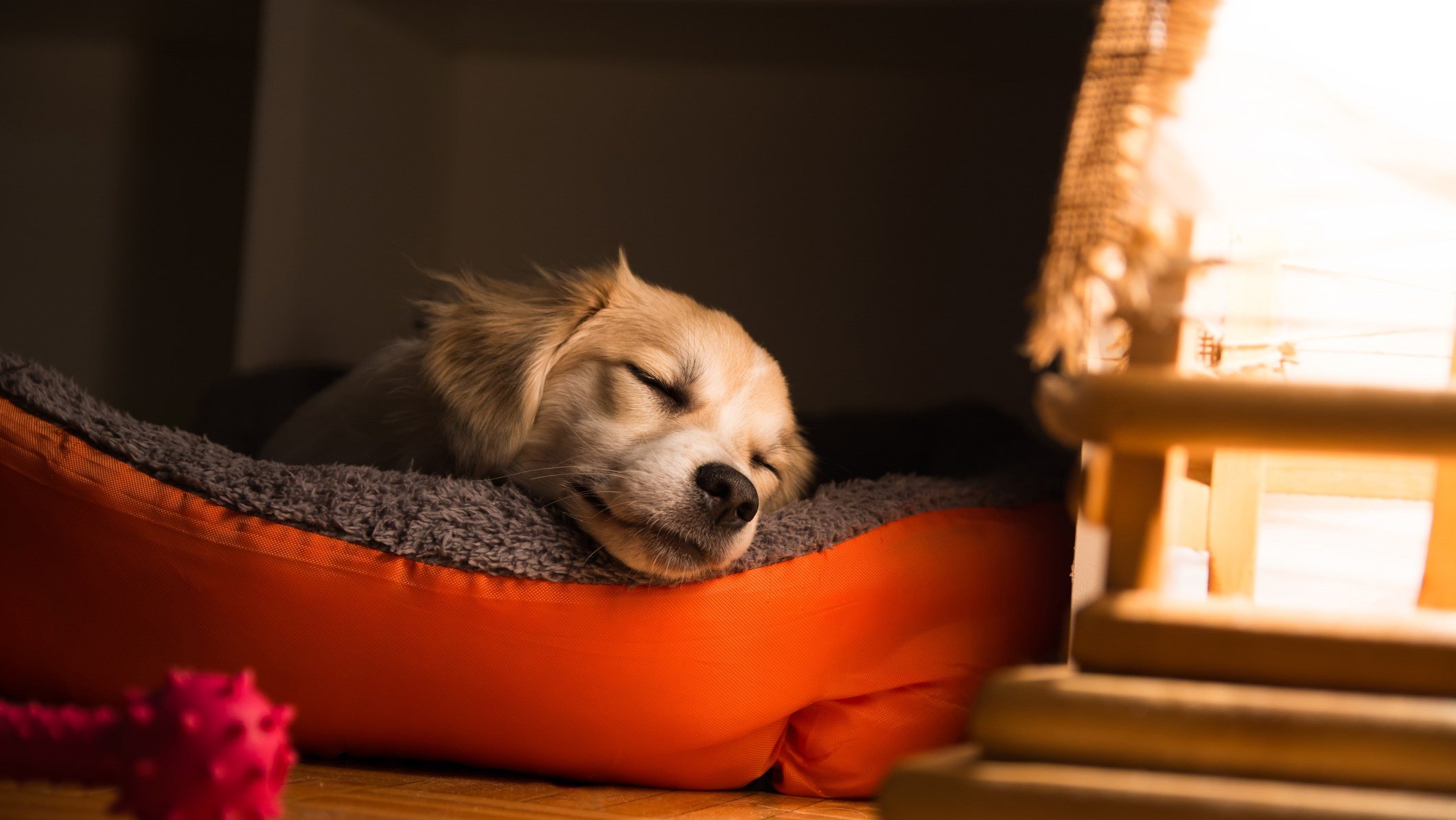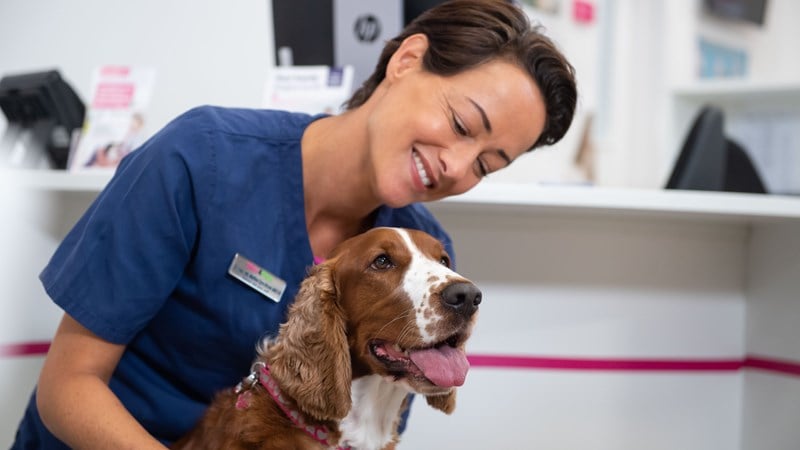
How much sleep do puppies need?
Learn how much puppies need to sleep and what the best bedtime routines are for puppies that can help them into healthy sleeping habits.
Just like human babies, puppies need the most sleep when they’re very young and they gradually require less as they get older. Of course, sleep can be influenced from day to day by things like physical activity levels, feeding, and human factors, such as play or training.
Dogs are diurnal, polyphasic sleepers, meaning they get most of their sleep during the night but take at least two naps during the day.
Adult dogs sleep on average for 10-12 hours per 24-hour period. Growing puppies require more sleep than most adult dogs do and, when they’re very young, their sleep is strongly polyphasic – they alternate short periods of feeding and activity with sleep throughout the day.
Surprisingly little is known about puppies’ sleeping habits and few studies exist that help us to understand it well. We do know, however, from experiments that were carried out in the past, that getting enough sleep is absolutely vital to growing puppies.
How much sleep do puppies need?
An eight-week-old puppy needs 18-20 hours’ sleep in a 24-hour period. This might seem like a lot, but puppies are growing and developing quickly and a lack of sleep can be more harmful to their health and well-being than even a lack of food would be.
During the day, young puppies are awake and active for short bursts and then they need to sleep for a while. It’s not uncommon for them just to fall asleep in the middle of a play session! Your puppy will let you know when they need a nap, by showing less interest in whatever they’re doing, going off to bed or perhaps whimpering to themselves. If you see this behaviour, particularly if your puppy is sniffing around and looking distracted, it’s a good idea to check whether they need to go to the toilet before you pop them into their sleeping area.
Sometimes, puppies might only sleep for a few minutes and at other times it might be much longer. It’s best not to disturb them until they are ready to wake again. When they do wake up, take them straight to their toilet area and reward them when they use it.
Whether your puppy sleeps for minutes at a time or for an hour or more, a healthy puppy is active and lively when they are awake. If your puppy lacks energy or seems drowsy or sleepy during periods of ‘awake time’, contact your vet team for advice.
Some breeds of dog, most often brachycephalic (flat-faced) breeds, suffer from sleep disorders associated with their breathing. Affected dogs snore when they sleep and if their oxygen levels in their blood were to be checked at the time, it may show that they were lower than they should be. When affected dogs are awake, they are often drowsy and they fall asleep very easily. Talk to your vet if you are concerned that your dog may be affected by sleep-disordered breathing.
As puppies get older, they can stay awake for longer periods of time and need fewer and shorter daytime naps. They also find it easier to stay asleep for more of the night. In a recent study, owners reported that their 16-week-old puppies slept, on average, just under 12 hours in a 24-hour period, with 3.5 hours of that taken as daytime naps.
By the time puppies are toilet-trained and are eating only two meals per day, their sleep patterns and requirements will begin to resemble more closely those of adult dogs.
At 12 months of age, young dogs reportedly sleep for just under 11 hours in a 24-hour period and nap for around three hours during the day.
Studies have found that adolescence is associated with further changes in sleep characteristics: Dogs over 1.5 years of age have been shown to sleep for between 60% and 80% of the night (taken as 8 am to 8 pm) and for 3-28% of the day.
What is a good bedtime routine for puppies?
Puppies and dogs can follow routines well and, for many, predictability helps to reduce stress and anxiety. It can help your puppy to relax and go to sleep if you begin to teach them a puppy bedtime routine as soon as possible. Get to know your own puppy and don’t try to insist they go to bed when they’ve only been awake for a short time and are still whizzing around and feeling playful. Other things that might prevent a puppy from wanting to settle down when you ask them to include needing to go to the toilet, feeling hungry, not having a comfortable, safe-feeling bed, and lots of other activities going on around them.
Provide your puppy with a comfortable bed, either in a puppy crate or somewhere that feels secure and from where they can still hear or see you. Toys that provide comfort, such as puppy-safe soft toys or chew-toys can help your puppy to self-settle when you leave them. Check toys and chews regularly to make sure they don’t present a choking hazard. If your puppy is in a crate or a puppy pen, a non-spill water bowl must be available inside.
It’s down to personal choice where your puppy sleeps. Many owners settle their puppies in a room on their own or at least separated from the human family. This can help to avoid sleep disturbance during the night. Others have their puppies sleeping in their bedroom with them to begin with, so that they can respond if the puppy wakes up during the night and needs to be let out for the toilet. Moving home from the breeder to a new environment can be stressful for a puppy, so you may like to provide them with reassurance during the night if they wake, either by having them close to you or, if they are safely in a crate, near to other dogs.
Feeding close to bedtime can make a puppy unsettled, so make sure your puppy has had some activity time and has been to the toilet between feeding and bedtime. Puppies often have a ‘crazy five minutes’, when they’re about to go to bed for the night, so you’ll need to let them get that out of their system before you try to settle them.
Wherever you put them to bed, if you use the same sleeping routine for your puppy and perhaps even a ‘bedtime word’ or phrase, they will soon learn what bedtime is all about. If you need to get up in the night to take your puppy to the toilet, it can be best to do this with as little fuss as possible, so they don’t begin to think of it as an opportunity for a midnight play-session!
As you get to know your puppy, you’ll start to recognise when they need to sleep. Make sure they get as much sleep as they need and don’t worry if this seems like a lot, especially for the first few weeks! As long as your puppy seems lively and happy when they are awake, you shouldn’t need to have any concerns and you can work on that puppy bedtime routine to set them up for life!
FAQs
Simply put, puppies need to sleep when they need to sleep. They will gradually adapt to what we think of as daytime and night-time as they get older. Trying to keep them awake so that we can put them to bed when it suits us and hoping for an unbroken night’s sleep doesn’t usually work and it’s not the best thing for a puppy. Ideally, begin your puppy bedtime routine from day one. Remember that bedtime for a puppy is a frequent thing, all through the day as well as at night, when they’re very young. This means that you can get a lot of practice in!
As you get towards your own bedtime, plan your puppy’s evening mealtime so that there’s an opportunity for some calm play and toilet breaks before you put them to bed and then go through your puppy bedtime routine as you would at any time of day. Settle them in their bed and, once they get the idea that nothing fun is going to happen for a while, they should go to sleep.
You may already have seen that puppies often get the ‘zoomies’ at bedtime. It’s perfectly normal for them to want to charge around and to play excitedly with toys, or to start yapping and play-biting, just as you’re thinking about putting them to bed for the night.
If they need to get rid of some excess energy and playfulness, this is the easiest way for them to do it. You may want them to settle before they’re quite ready and you might think they will never want to go to bed!
Physical exercise is one way to tire out your puppy, but it’s much better for a growing puppy’s body if they dictate the level of exercise they can manage, rather than you trying to wear them out yourself by encouraging lively physical play.
Mental exercise and training, or using their nose to find things, are also tiring for a puppy but without the wear-and-tear on their body, and these can be very useful when you’d like your puppy to settle. A short training session, using small, tasty treats, can help to tire out your puppy mentally without getting them excited. A calm game of ‘hide and seek’ with your puppy’s toys can have the same effect.
Just remember to make sure to take your puppy for a toilet break during any pre-bedtime play or training and again, just before they are put to bed.
Many owners worry that letting their puppy sleep during the evening, or before bedtime, is going to lead to a sleepless night, with a lively puppy wanting to play in the middle of the night.
Puppies need to sleep when they need to sleep so, depriving a puppy of sleep, so that you can meet a set puppy bedtime, isn’t ideal for them. It’s better to allow them to sleep when they’re ready and to let them go through a sleep-wake cycle again and put them to bed once they’re becoming tired around your own bedtime. As they get older, puppies can stay awake for longer and this will gradually allow their natural inclination to go to sleep to align better with your own.
Health Plans to keep your dog healthy
At Vets4Pets we offer a range of Health Plans that make essential routine treatments more affordable. You'll save money on things like annual vaccinations, flea and worm treatment and routine health check-ups.

Dog Advice
Read more of our expert dog advice to keep your dog happy and healthy.
